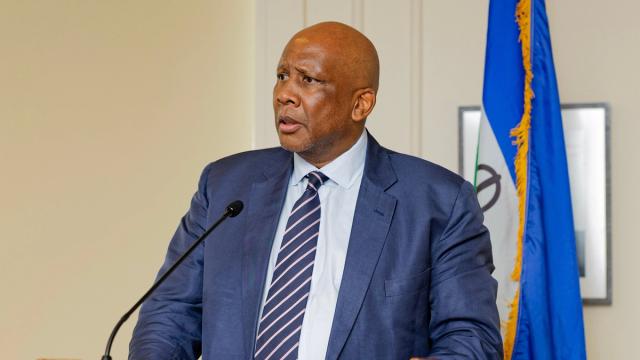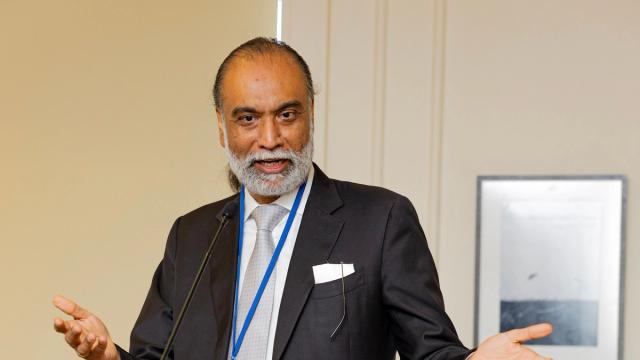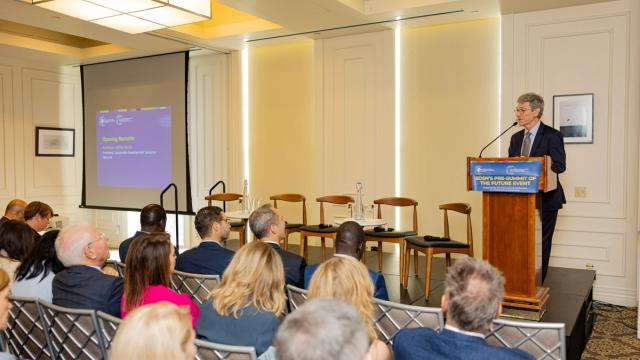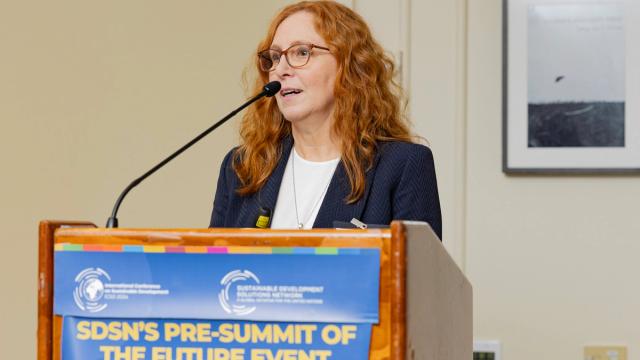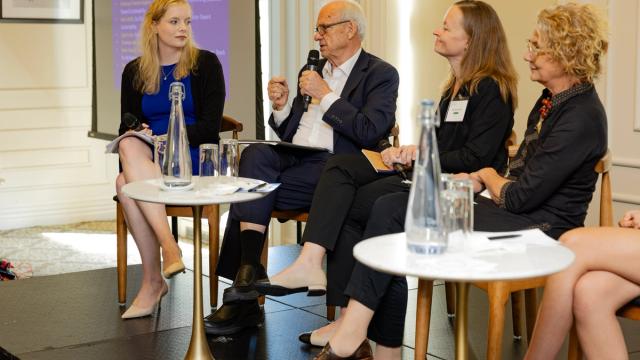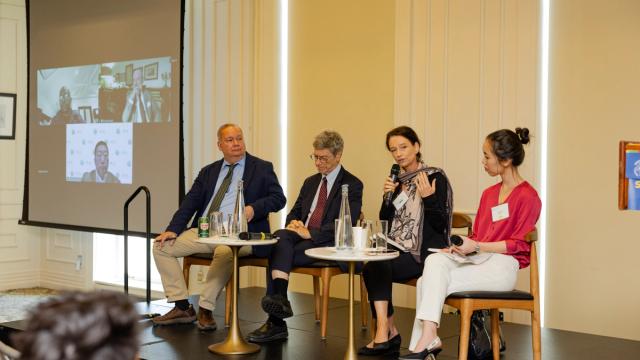Pathways to Progress: Insights from SDSN’s Pre-Summit of the Future
Alongside the UN General Assembly and the Summit of the Future, the United Nations Sustainable Development Solutions Network (SDSN) convened top world leaders, academics, and industry experts for its 2024 High-Level Pre-Summit of the Future Conference on September 20 and 21, 2024. Together, we explored key challenges facing the implementation of Sustainable Development Goals (SDGs) and innovative solutions, the role of institutions and new technology, solutions to achieve international peace and security, and the importance of global cooperation and enhancing multilateralism to confront today’s 21st century problems. Read below for a brief summary of the sessions and learnings.
[Watch Day One | September 20] [Watch Day Two | September 21]
Day One | September 20, 2024
Financing the Future: Catalyzing Innovative Strategies and New Institutions for Sustainable Development Financing
This session, featuring a keynote from former Kenyan Prime Minister Rt. Hon. Raila A. Odinga, addressed the critical need for global financial reform to support sustainable development. Odinga highlighted challenges including climate change, global pandemics, misinformation, and rising debt, stressing the importance of a transparent, accountable global financial system. A panel discussion followed, examining the role of multilateral development banks, urban financing, and financial instruments. Panelists noted a need for reform in the global financial infrastructure to make it more inclusive, particularly for cities in developing countries that are restricted from accessing international capital markets. They point to innovative financing solutions like SDG bonds and partial credit guarantees, which build trust in markets, allow for more favorable borrowing conditions, and, thus, make sustainable development more financially accessible.
Panelists included:
- Professor Jeffrey Sachs, President, SDSN (moderator)
- Mayor Katrin Stjernfeldt Jammeh, Mayor of Malmö Municipality and President of ICLEI
- Dr. Mauricio Rodas, Former Mayor of Quito and Visiting Scholar, Penn Institute for Urban Research
- Mr. Jordan Schwartz, Executive Vice President of the Inter-American Development Bank
- Mme. Adidjatou HASSAN ZANOUVI, Deputy Chief of Staff of the Ministry of Economy and Finance, Government of Benin and President of the Benin Carbon Project Registration Authority
Reimagining Education for Peaceful and Sustainable Futures: Featuring the Launch of Ages of Globalization
The session highlighted the importance of education in sustainable development, particularly through SDG 4.7, which emphasizes teaching students critical skills for global citizenship, peace, and cultural diversity. The session began with opening remarks from Stefania Giannini, UNESCO Assistant Director-General for Education, and Beverley Smith, the Ministry of Tourism’s Sustainable Tourism Global Centre’s Head of Partnerships. Amanda Abrom, Director of SDSN’s Global Schools program, then introduced a panel discussing challenges and solutions in aligning education systems with sustainable development. Panelists called on schools to equip students with practical tools, skills, and hands-on, real-world learning, empowering them to become advocates for change. Participants also noted the need for multi-sectoral partnerships and collaborations across educational systems that engage local communities to ensure inclusive, effective, and scalable educational solutions.
Panelists included:
- Professor Jeffrey Sachs, President, SDSN (moderator)
- Dr. Charles Hopkins, Co-Chair, UNESCO Chair in Reorienting Education toward Sustainability
- Dr. Katrin Kohl, Co-Chair, UNESCO Chair in Reorienting Education toward Sustainability
- Ms. Ligia Cravo, Senior Program Officer, Hearst Foundations
- Ms. Chaewon Ida Joung, Student at Shanghai American School
- Ms. Nene Onyedi Ibezim, Teacher and Founder of the Leading Kids Program, Teach for All Fellow, and Global Schools Program Advocate
Turning the Tide: Exploring the Ethical, Political, and Practical Dimensions of Global Peace and Security
This session delved into the multi-dimensional challenges facing global peace and security, featuring keynote addresses by H.E. Miguel Ángel Moratinos, Under-Secretary-General and High Representative for the UN Alliance of Civilizations, and H.E. Judge Abdel-Salam, Senior Representative of His Eminence Grand Imam of Al-Azhar and Secretary-General of the Muslim Council of Elders and Co-President of Religions for Peace. Moratinos underscored the need to prioritize peace over security, arguing that without peace, the SDGs and global progress are unattainable, while Abdel-Salam highlighted the moral authority of religious leaders in fostering peaceful coexistence and addressing global challenges such as climate change and conflict. A panel discussion followed, exploring the limitations of international institutions, like the UN, in conflict resolution. Participants called for a rethinking of international law and diplomacy, stressing the importance of multilateral cooperation and ethical leadership to end violence and achieve lasting peace.
Panelists included:
- Sybil Fares, MENA Advisor, SDSN (moderator)
- Michael von der Schulenburg, Member of the European Parliament for Germany
- H.E. Mr. Vuk Jeremić, Former President of the UN General Assembly and President of the Center for International Relations and Sustainable Development
- Professor Jeffrey Sachs, President, SDSN
Fact Meets Fiction: Ministry of the Future and Summit of the Future
In this session, Kim Stanley Robinson, the author of Ministry for the Future, discussed how science and climate fiction explores the future through narratives that blend utopian and dystopian elements. Robinson emphasized that while we can't predict the future, science fiction helps us explore possibilities and solutions for climate challenges, drawing parallels to human survival strategies.
AI Ethics and Safety
In this Kapuscinski Development Lecture, Dr. Francesca Rossi, IBM’s AI Ethics Global Leader discussed the evolution of AI, highlighting the risks posed by large language models (LLMs), such as bias, misinformation, and environmental costs. She stressed the need for ethical frameworks and proper implementation, noting “the responsibility is not just for companies, or just for governments, it is really given to all societal actors…including each one of us as a user of services supported by AI.”
Re-envisioning the Workforce for a Common Digital Future
The session addressed the impact of AI on various sectors, with remarks by Professor Yanis Ben Amor, the Executive Director of Columbia University’s Center for Sustainable Development, Mr. Richard Attias, the CEO of the Future Investment Initiative Institute, and Mr. Amandeep Singh Gill, the Under-Secretary General and UNSG’s Tech Envoy. After reviewing a series of UN recommendations outlined in the report, “Governing AI for Humanity,” Under-Secretary-General Gill stressed that “new technologies are going to reshape the way we live, how our economies work, how our political systems work, how power is distributed, how we relate to each other as human beings…and the task of preparing ourselves for that future should start right now.” Panelists then explored AI's influence on healthcare, education, and ethical considerations, emphasizing the need for new learning assessments, inclusivity, and careful integration of AI in society.
Panelist included:
- Professor Yanis Ben Amor, Executive Director of the Center for Sustainable Development, Columbia University (moderator)
- Dr. Abdulelah Alhawsawi, CEO, Novo Genomics
- Dr. Radhika Iyengar, Research Scholar, Center for Sustainable Development
- Dr. Antoine Blondelle, Director of ESPAS-ESTICE, Catholic University of Lille
- Dr. Louis-Marie Clouet, Director of Foresight at the Strategy and Development Department of the Catholic University of Lille
Day Two | September 21, 2024
Advancing a ‘United Nations 2.0’ and Transforming Global Governance
The session featured keynote addresses by H.E. Mia Mottley, the Prime Minister of Barbados, and H.E. Cristina Duarte, Under-Secretary General and Special Advisor on Africa. Mottley emphasized fairness, transparency, and equity in the global financial architecture, while Duarte analyzed the dynamics between globalization and multilateralism. Both speakers stressed the importance of collective action and the transformation of the UN to address emerging global challenges. The panel discussion further explored how to revitalize multilateralism and reform the UN to better reflect modern geopolitical realities. Participants noted that short-term political cycles and electoral goals often undermine long-term, sustainable efforts, calling for greater multilateral cooperation and commitment. They also stressed the necessary inclusion of young people, civil society, and the private sector to make the UN more representative and effective.
Panelists included:
- Professor John Thwaites, Chair, Monash Sustainable Development Institute and Climateworks Centre (moderator)
- H.E. Mr. Paulo Lopes Marcelo, Secretary of State of the Presidency of the Council of Ministers, Portuguese Republic Government
- Mr. Oliver Röpke, President of the European Economic and Social Committee
- Mr. Guillaume Lafortune, Vice President of the SDSN and Head of the Paris Office
The Future of Energy
This session, co-organized with the Global Energy Interconnection Development and Cooperation Organization (GEIDCO), highlighted the need for a global transition to green, renewable energy systems. Professor Jeffrey Sachs opened by pointing to the damaging impact of fossil fuels on the environment and the necessity of shifting towards mass-scale renewable sources like wind and hydropower.
Keynotes further explored specific initiatives and strategies for the energy transition and underscored the critical role of international cooperation and investment. His Majesty King Letsie III of Lesotho stressed the importance of moving away from an economy based on migrant labor and mining towards one centered on renewable energy resources. Xin Baoan, Chairman of GEIDCO, outlined five trends shaping the future of energy, including the development of clean energy, grid interconnectivity, and the integration of smart technologies. Other keynote speakers included Ambassador of the People's Republic of China to the United Nations Fu Cong, Under-Secretary-General and Associate Administrator of UNDP, Mr. Haoliang Xu, Assistant Secretary-General Selwin Charles Hart, Special Adviser to the Secretary-General on Climate Action and Just Transition, as well as video messages from H.E. Ms. Amina J. Mohammed, UN Deputy-Secretary General, and Under-Secretary General for Economic and Social Affairs Li Junhua. The session culminated in the announcement of a Future Energy Declaration, setting ambitious goals for renewable energy adoption, system stability, and job creation in the global shift toward low-carbon economies.
Global Ethics for a New Multilateralism
This discussion explored how civilizations, philosophies, and cultures can shape a more ethical, inclusive, and sustainable world order. Panelists addressed the need for global cooperation to avoid conflict and promote human rights, philosophical diversity and ethics in AI development, and challenges and solutions in sustainability. The conversation also explored the historical marginalization of non-Western philosophies and the necessity of integrating diverse philosophical traditions into global frameworks to enhance mutual understanding and ethical decision-making.
Panelists included:
- Philo Wang, Manager, SDSN (moderator)
- Professor Jeffrey Sachs, President, SDSN
- Katja Vogt, Professor of Philosophy at Columbia University
- Jianyu Zhang, Executive Director the Belt and Road Initiative International Green Development Institute at the Belt and Road Initiative International Green Development Coalition (BRIGC)
- Siseko Kumalo, Lecturer of Philosophy at the University of Fort Hare
- Riccardo Pozzo, Professor of Philosophy at Tor Vergata University of Rome and Pontifical Academy of Social Sciences
- Bryan W. Van Norden, James Monroe Taylor Chair in Philosophy at Vassar College
Empowering Youth and Future Generations Through Transformative Education
This session highlighted the critical role of education in driving societal change, with a particular focus on developing countries and marginalized communities. H.E. Dr. Yaw Osei Adutwum, Ghana’s Minister of Education, discussed Ghana's efforts to eliminate obstacles to education, implement free secondary schooling, and advance STEM education. Panelists then explored the systemic barriers to education, the global divide in education access, and youth engagement in shaping education systems. They stressed the need for education systems to embrace digitalization, social, and emotional learning and for greater global investment in education.
Panelists included:
- Paul Walsh, Vice President of Education, SDSN and Director of the SDG Academy (moderator)
- Dr. Mary Joy Pigozzi, Executive Director, Educate A Child (EAC), a programme of the Education Above All Foundation
- Dr. Andreas Schleicher, Director for Education and Skills, OECD
- Ms. Yasmine Sherif, Executive Director, Education Cannot Wait
- Mr. Ilan Enverga, SDG4 Youth and Student Executive Committee Representative
Fostering Meaningful Youth Engagement for the SDGs and the 2030 Agenda: A Spotlight on Youth Initiatives
In this session, focused on SDSN’s Youth initiatives, the winner of the “Universities for SDG 13” competition hosted by the SDSN and Siemens Gamesa was announced. The award ceremony was followed by a panel session with program leads from SDSN Youth, all of whom emphasized the importance of youth inclusion and collaboration in sustainable development efforts.
Panelists included:
- María Cortés-Puch, Vice President of Networks, SDSN (moderator)
- Ms. Jingyi Tong, Strategy and Operations Project Lead, SDSN Youth
- Ms. Sanjana Chhantyal, Youth Solutions Program Project Lead, SDSN Youth
- Mr. Nnaemeka Phil Eke-okocha, Local Pathways Fellowship Project Lead, SDSN Youth
